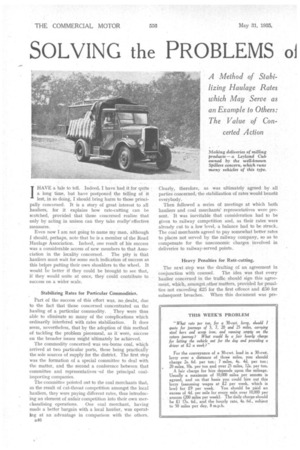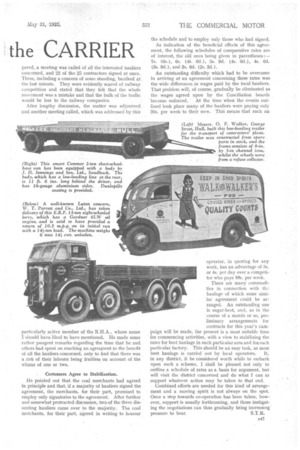SOLVING the PROBLEMS ol the CARRIER A Method of SIGNlizing
Page 64

Page 65

If you've noticed an error in this article please click here to report it so we can fix it.
Haulage Rates which May Serve as an Example to Others: The Value of Con
certed Action
IHAVE a tale to tell. Indeed, I have had. it for quite a long time, but have postponed the telling of it lest, in so doing. I should bring harm to those principally concerned. It is a story of great interest to all hauliers, for it explains how rate-cutting can be scotched, provided that those concerned realize that only by acting in unison can they take really' effective measures.
Even now I am not going to name my man, although I should, perhaps, note that he is a member of the Road Haulage Association. Indeed, one result of his success was a considerable access of new members to that Asso ciation in the locality concerned. The pity is that hauliers must wait for some such indication of success as this befre putting their own shoulders to the wheel. It would be better if they could be brought to see that, if they would unite at once, they could contribute to success on a wider scale.
Stabilizing Rates for Particular Commodities.
Part of the success of this 'effort was, no doubt, due to the fact that those concerned concentrated on the hauling of a particular commodity. They were thus able to eliminate so many of the complications which
ordinarily interfered with rates stabilization. It does seem, nevertheless, that by the adoption of this method of tackling the problem piecemeal, as it were, success on the broader issues might. ultimately be achieved.
The commodity concerned was sea-borne coal, whi0 arrived at two particular ports, these being practically the sole sources of supply for the district. The first step was the formation of a special committee to deal with the matter, and the second a conference between that committee and representatives -of the principal coalimporting companies.
The committee pointed out to the coal merchants that, as the result of cut-throat competition amongst the local hauliers, they were paying different rates, thus introducing an element of unfair competition into their own merchandising operations. One coal merchant, having made a better bargain with a local haulier, was operating at an advantage in comparison with the others.
B46 Clearly, therefore, as was ultimately agreed by all parties concerned, the stabilization of rates would benefit everybody.
Then followed a series of meetings at which both hauliers and coal merchants' representatives were present. It was inevitable that consideration had to be given to railway competition and, as their rates were already cut to a low level, a balance had to be struck. The coal merchants agreed to pay somewhat better rates to places not served by the railway company, so as to compensate for the uneconomic charges involved in deliveries to railway-served points, Heavy Penalties for Rate-cutting.
The next step was the drafting of an agreement in
conjunction with counsel. The idea was that every haulier concerned in the traffic should sign this agreement, which, amongst othermatters, provided for penalties not exceeding £25 for the first offence and £50 for subsequent breaches. When this document was pre pared, a meeting was called of all the interested hauliers concerned, and 22 of the 25 contractors signed at once. Three, including a concern of some standing, baulked at the last minute. They were evidently scared of railway competition and stated that they felt that the whole movement was a mistake and that the bulk of the traffic would be lost to the railway companies.
After lengthy discussion, the matter was adjourned and another meeting called, which was addressed by this
particularly active member of the R.H.A., whose name I should have liked to have mentioned. He made some rather pungent remarks regarding the time that he and. others had spent on reaching an agreqment to the benefit of all the hauliers.concerned, only to find that there was a risk of their labours being fruitless on account of the whims of one or two.
. Customers Agree to Stabilization.
He pointed out that the coal merchants had agreed in principle and that, if a majority of hauliers signed the agreement, the merchants, for their part, promised to employ only signatories to the agreement. After further and somewhat protracted discussion, two of the three dissenting hauliers came over to the majority. The coal merchants, for their part, agreed in writing to honour, the schedule and to employ only those who had signed.
As indication of the beneficial effects of this agreement, the following schedules of comparative rates are of interest, the old ones being given in parentheses :'Is. (Os.), Os. (41. 6d.), 5s. 9d. (4s. 6d.), 4s. 6d. Os. 9d.), and 3s. 6d. (2s. 3d.).
An outstanding difficulty which had to be overcome in arriving at an agreement concerning these rates was the wide differences, in wages paid by the local hauliers. That problem will, of course, gradually be eliminated as the wages agreed upon by the Conciliation boards become enforced. At the time when the events outlined took place many of the hauliers were paying only 30s. per 'week to their men. This means that such an operator, in quoting for any work, has an advantage of 3s. or 4s. per day over a cOmpetitor who pays 50s. per week.
There are many commodities in connection with the haulage of which some similar agreement could be arranged.. An outstanding one is sugar-beet, and, as in the course of a month or so, preliminary arrangements for contracts for this year's campaign will be made, the present is a most suitable time for commencing activities, with a view to stabilizing the rates for beet haulage in each particular area and for each particular factory. This should be an easy task, as most beet haulage is carried out by local operators. It, in any district, it be considered worth while to embark upon such a scheme, I shall be pleased not only to outline a schedule of rates as a basis for argument, but will visit the district concerned and do what I can to support whatever action may be taker to that end.
Combined efforts are needed for this kind of arrangement and a moving spirit is not always on the spot. Once a step towards co-operation has been taken, however, support is usually forthcoming, and those instigating the negotiations can thus gradually bring increasing pressure to bear. S.T.R.




































































































